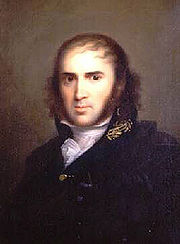
Johann Carl Simon Morgenstern
Encyclopedia

Bildungsroman
In literary criticism, bildungsroman or coming-of-age story is a literary genre which focuses on the psychological and moral growth of the protagonist from youth to adulthood , and in which character change is thus extremely important...
.
Biography
Morgenstern was born in MagdeburgMagdeburg
Magdeburg , is the largest city and the capital city of the Bundesland of Saxony-Anhalt, Germany. Magdeburg is situated on the Elbe River and was one of the most important medieval cities of Europe....
. He studied at the University of Halle
University of Halle-Wittenberg
The Martin Luther University of Halle-Wittenberg , also referred to as MLU, is a public, research-oriented university in the cities of Halle and Wittenberg within Saxony-Anhalt, Germany...
under Johann August Eberhard in philosophy and Friedrich August Wolf
Friedrich August Wolf
Friedrich August Wolf was a German philologist and critic.He was born at Hainrode, a village not far from Nordhausen, Germany. His father was the village schoolmaster and organist...
in philology.
In 1802 he moved to Dorpat where he would spend the rest of his life. He held the chair for rhetoric
Rhetoric
Rhetoric is the art of discourse, an art that aims to improve the facility of speakers or writers who attempt to inform, persuade, or motivate particular audiences in specific situations. As a subject of formal study and a productive civic practice, rhetoric has played a central role in the Western...
, classical philology, aesthetics
Aesthetics
Aesthetics is a branch of philosophy dealing with the nature of beauty, art, and taste, and with the creation and appreciation of beauty. It is more scientifically defined as the study of sensory or sensori-emotional values, sometimes called judgments of sentiment and taste...
, and history of art
History of art
The History of art refers to visual art which may be defined as any activity or product made by humans in a visual form for aesthetical or communicative purposes, expressing ideas, emotions or, in general, a worldview...
and literature at the newly refounded University of Dorpat and was the first director of its library.
The character of his work changed in Dorpat. He discontinued his Plato
Plato
Plato , was a Classical Greek philosopher, mathematician, student of Socrates, writer of philosophical dialogues, and founder of the Academy in Athens, the first institution of higher learning in the Western world. Along with his mentor, Socrates, and his student, Aristotle, Plato helped to lay the...
studies and wrote about literature, art, philology, and philosophy. Morgenstern's former teacher Friedrich Wolf was disappointed by this development, and he remarked in 1808 that his student was growing more elegant, vain, and boring with the years. It was in the course of this work that Morgenstern coined "Bildungsroman
Bildungsroman
In literary criticism, bildungsroman or coming-of-age story is a literary genre which focuses on the psychological and moral growth of the protagonist from youth to adulthood , and in which character change is thus extremely important...
".
Even after his retirement in 1834 Morgenstern stayed in Dorpat. He bequeathed his 12,000-volume library, containing many manuscripts and a good part of the Kant
KANT
KANT is a computer algebra system for mathematicians interested in algebraic number theory, performing sophisticated computations in algebraic number fields, in global function fields, and in local fields. KASH is the associated command line interface...
estate, to the university.
Works
- De Plationis Republica commentationes tres (1794)
- Auszüge aus den Tagebüchern und Papieren eines Reisenden (1811–1813)
- Über den Geist und Zusammenhang einer Reihe philosophischer Romane (1817)
- Über das Wesen des Bildungsromans (1820)
- Zur Geschichte des Bildungsromans (1824)
Cultural references
In William GoldmanWilliam Goldman
William Goldman is an American novelist, playwright, and Academy Award-winning screenwriter.-Early life and education:...
's novel The Princess Bride
The Princess Bride
The Princess Bride is a 1973 fantasy novel written by William Goldman. It was originally published in the United States by Harcourt Brace, while in the UK it is/was published by Bloomsbury Publishing....
the fictional author S. Morgenstern is almost certainly a nod to Morgenstern's coining of the term Bildungsroman
Bildungsroman
In literary criticism, bildungsroman or coming-of-age story is a literary genre which focuses on the psychological and moral growth of the protagonist from youth to adulthood , and in which character change is thus extremely important...
, as the novel is representative of the genre.

